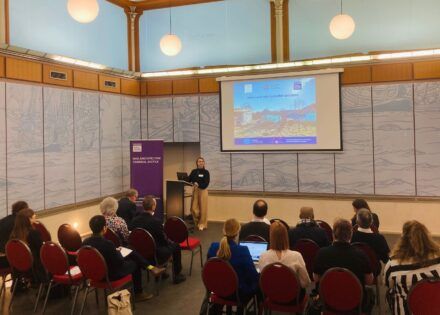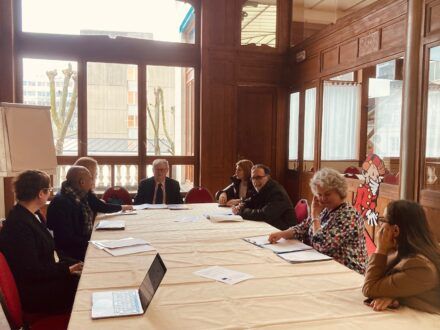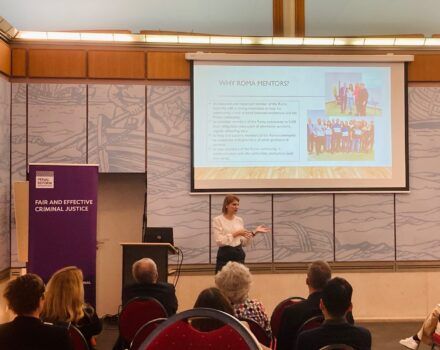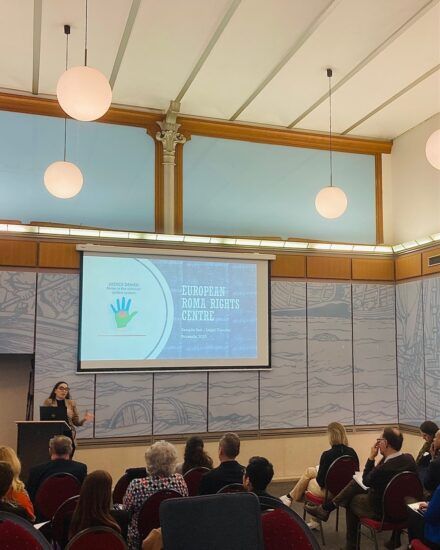PRI brings together experts in a roundtable on Roma and non-custodial sanctions

On 7 March 2023, PRI hosted a multi-stakeholder regional roundtable in Brussels to discuss and address problems faced by Roma in European criminal justice systems, especially within the context of implementing non-custodial sanctions and measures. The roundtable discussions benefitted from the expertise and perspective of criminal justice practitioners from seven European countries as well as representatives of the European Commission, the Council of Europe’s Council for Penological Co-operation (PC-CP), the Confederation of European Probation (CEP), and non-governmental organisations working on human rights-based criminal justice and Roma rights.
The basis of the discussion was an exploratory study by PRI on challenges and barriers that hinder access to and implementation of non-custodial measures for Roma, such as issues related to housing or employment, culture or customs, making custodial sanctions the prominent form of the execution of the sentences. Research by the European Roma Rights Centre (ERRC) and Fair Trials was also presented, highlighting Roma overrepresentation and discrimination of Roma across all stages of criminal justice in systems across eight European countries. The European Commission’s Non-discrimination: anti-racism and Roma coordination Unit shared insights from the EU Roma strategic framework for equality, inclusion and participation 2020-2030, and participants had an opportunity to learn about Roma mentors – an innovative example of needs-informed, collaborative and culturally sensitive probation practice from the Czech Republic and Croatia.
“Anti-Roma racism is normalised in the processes, attitudes, and behaviour of [criminal justice] institutions. There seems to be no capacity to question the laws and […] policies of a system that criminalises the most marginalised for the committing of petty offences, that disproportionately targets and incarcerates Roma, and only serves to exacerbate socio-economic exclusion and reinforce discrimination.”
– Justice denied: Roma in the criminal justice system, ERRC and Fair Trials

Participants at the roundtable discussion on Roma and non-custodial sanctions
Key takeaways from the expert roundtable included:
- Practical and culture-sensitive solutions, realised in consultation with Roma representatives, are key to ensuring access to justice and meaningful sentencing measures for Roma, including assessment practices that move beyond risk and take into account strengths and needs.
- Collecting more comprehensive, disaggregated, race- and ethnicity-based data to inform reforms in policy and practice is important, but it also comes with risks and challenges related to its accuracy and use.
- The value of qualitative data and the knowledge we already have of discrimination in criminal justice systems should not be downplayed.
- Positive stories – examples of Roma successes and strengths – can be an important tool in changing stereotypical attitudes and tackling discrimination. There should be a focus on recognising and disseminating such examples and facilitating personal experiences of positive contact with Roma communities.
- Strengths-based assessments in terms of risks and needs is important, particularly with Roma communities where discriminatory stereotypes lead to harsher outcomes in decision-making
- National and regional multi-level strategies play an important role in supporting action toward non-discrimination in the criminal justice systems; varied stakeholders should break outside individual silos, and criminal justice efforts toward anti-discrimination should be mainstreamed.
- International and regional multilateral efforts need to be stepped up, including standard-setting initiatives, to tackle the challenges in ensuring criminal justice systems meet the needs and tackle discrimination of Roma
- There is clear need for a comprehensive, multi-agency approach in tackling identified challenges to ensure that criminal justice systems apply non-custodial measures for Roma in a non-discriminatory and inclusive manner. Probation services, as a central part of the justice chain, can play a key role in bringing relevant stakeholders together to support Roma across all stages of criminal justice processes.
The event is part of PRI’s “Promoting non-discriminatory alternatives to imprisonment in Europe” project, funded by the European Union and realised in partnership with the Hungarian Helsinki Committee and University of Coimbra, and was co-funded by the International Penal and Penitentiary Foundation (IPPF).

Presentation on Roma mentors – a promising practice in supporting Roma during probation supervision in Croatia

Presentation of research by the European Roma Rights Centre and Fair Trials on challenges and discrimination faced by Roma in European criminal justice systems
